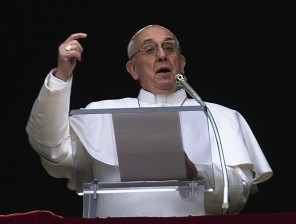Folksy pope wins more hearts with first Angelus

Pope Francis gestures as he delivers his Angelus prayer from the window of his studio overlooking St. Peter’s Square, at the Vatican, Sunday, March 17, 2013. Breaking with tradition, Pope Francis delivered off-the-cuff remarks about God’s power to forgive instead of reading from a written speech for the first Sunday window appearance of his papacy. AP PHOTO/DOMENICO STINELLIS
VATICAN CITY—Pope Francis on Sunday underscored his man-of-the-people approach with his first Angelus prayer as pontiff, taking a folksy tone in front of 150,000 enthusiastic pilgrims in St. Peter’s Square.
“Brothers and sisters, hello,” said the Argentine pope, using the same formula as when he greeted the faithful for the first time after his surprise election on Wednesday.
“Thank you for your welcome, and for your prayers,” the first pope from Latin America said from a window of the papal apartment high above the square. “Pray for me,” he urged.
Many pilgrims in the square waved the flag of Argentina as the former cardinal Jorge Mario Bergoglio recited the traditional Sunday Angelus prayer.
Flags from other Latin American nations including Colombia, Peru, Paraguay and Mexico could also be seen in the crowd.
One banner read: “Francis, You Are the Springtime of the Church,” reflecting a groundswell of hope that the choice of a humble outsider has inspired many Catholics weary of Vatican scandal and dysfunction.
“With words and gestures he has already succeeded in winning the faithful’s hearts,” said 52-year-old Francesco Baldan, from Venice.
Gabriel Solis, 33, an Argentinian, said he felt “indescribable emotion.”
“He will bring much peace because he seems more humble, more spontaneous,” he said. “He seems closer to the people. We didn’t feel that with the pope we had before.”
The Angelus has traditionally been a moment to comment on international issues, but Francis instead used the occasion to emphasize his Italian roots.
The former Buenos Aires archbishop, whose parents emigrated from Italy to Argentina, said he chose to name himself after St. Francis of Assisi “to reinforce my spiritual tie with this land.”
Earlier Sunday the pope grabbed an opportunity to shake hands with well-wishers, plunging into crowds pushing against barricades outside a Vatican gate as security men and Swiss Guards stood nervously by.
Chanting “Viva Il Papa” and calling his name, the well-wishers jostled to greet the new pontiff, who has projected a common touch by breaking with many formal traditions since he began leading the world’s 1.2 billion Catholics.
The 76-year-old pope’s informal style is in marked contrast to that of his more austere 85-year-old predecessor Benedict XVI, who stunned the world last month by resigning citing his advanced age.
A million people may attend Francis’s inauguration Mass on Tuesday, including world leaders who are set to begin flying into Rome on Sunday.
Among them is Argentine President Cristina Kirchner who had tense relations with Bergoglio, the former archbishop of Buenos Aires, over issues such as homosexuality and birth control.
The two will hold a face-to-face meeting on Monday, the Vatican said.
US Vice President Joe Biden was also due to arrive in Rome later Sunday.
A Zimbabwean official, meanwhile, said President Robert Mugabe—who is under EU travel sanctions—planned to attend the inauguration, noting that “the Vatican is a state on its own.”
Mugabe, a staunch Catholic who has been widely condemned for human rights abuses, visited the Vatican in May 2011 for the beatification of the late pope John Paul II—whose funeral in 2005 he also attended.
Francis has already spoken to Catholic leaders about the need for spiritual renewal and evangelization and cautioned them against worldly glories.
He warned cardinals that the Church would fall apart “like a sand castle” if it did not have a solid spiritual foundation and urged them to share their wisdom—”good wine that gets better over the years”—with young people.
At the same time, Francis has faced accusations at home that he failed at the time to speak out against brutalities committed during the years of the military junta in Argentina (1976-1983) when he was head of the country’s Jesuits.
The Vatican has firmly rejected claims that Bergoglio failed to intervene when two Jesuit priests were tortured by the dictatorship, saying the allegations were part of a leftist, anti-clerical campaign.
Francis is a moderate conservative who is unlikely to change key doctrine but experts say that he could push for more social justice and a friendlier faith.
Vatican watchers are keeping a close eye on nominations to top posts as an indication of what changes in substance his papacy could herald.
Francis will meet next Saturday with Benedict, the first pope to stand down since the Middle Ages.
Media outlets are getting to grips with another effect of the change in style between the two popes.
While the Vatican usually supplied the texts of Benedict’s speeches in advance, often translated into several languages, this has so far been impossible with the new pope, who is given to speaking off-the-cuff.














